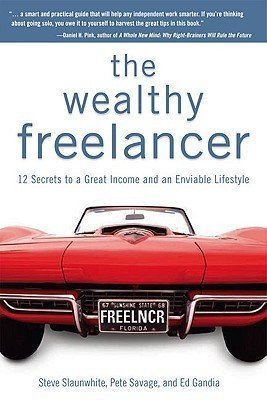
The Wealthy Freelancer: 12 Secrets to a Great Income and an Enviable Lifestyle by Steve Slaunwhite
My rating: 5 of 5 stars
This is definitely the best book on freelancing I’ve read so far! Many freelancers assume that they must choose between a high income and the freedom of freelancing, so they settle for an income that barely pays the bills. This book shows you how to have the freelance lifestyle you want and still achieve financial success. Topics include marketing, prospecting, client relations, pricing, productivity, work-life balance, and income streams.
The 3 authors dispense page after page of practical advice for web designers, graphic designers, copywriters, and other freelancers. I liked the many efficiency and productivity tips, and especially liked the chapters on pricing, focus, work-life balance, and the appendix on opportunities and obstacles.
The authors use “wealthy” to mean more than financial success; they say, “A wealthy freelancer is someone who consistently gets the projects, clients, income, and lifestyle he or she wants” and “Wealthy freelancers don’t just make a living. They design a fulfilling and meaningful life.”
I read this book because it was recommended by FreelanceSwitch.
Create a buzz piece like a special report, how-to guide, tips, interview, Q&A.
Find organizations whose members truly understand the value of your services and could potentially hire you. Become an active member in 1-3 organizations. Volunteer, and join committees and boards.
Use project pricing for the following reasons:
If the project is undefined, hourly may be the better choice.
Create a fee schedule with price ranges.
Provide a ballpark price during initial calls to deal with price objections right away. Later, provide quote/proposal based on details.
Ask clients what they want to accomplish. They pay for results, not work.
Response to price objections: “I can appreciate your concern. Although that fee range is typical of what professionals charge for this type of project, I’m sure we can work something out. How much were you expecting to budget for this work?”
Don’t simply lower your price; negotiate an exchange of value:
After sending a quote, follow up the same or next day. Act like you got the job, and ask about getting started. Don’t mention price.
Most freelancers don’t need professional liability (errors and omissions) insurance, but consult an attorney.
Don’t consider contingency fee (percentage of profits) arrangements unless the client has a good reputation and track record. If you do, base fees on something trackable like clicks or sales, not profits. Demand a 50% deposit. Have a detailed contract.
Spell out the number and timeframe of allowed revisions in quote/proposal/agreement. Tell clients you want final revisions, not multiple drafts.
Don’t be afraid to take on new project types. They could be great learning experiences, well-paying, and first steps toward becoming an expert. If the client is ready for you to start, do your research and go! If you need to sell the client, admit that you haven’t done that type of work specifically, but tell them about similar work you’ve done.
Never reduce fees for the promise of future work. It’s better to spend time finding better-paying clients than doing underpaid work.